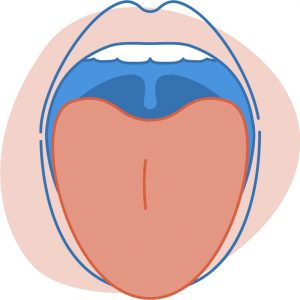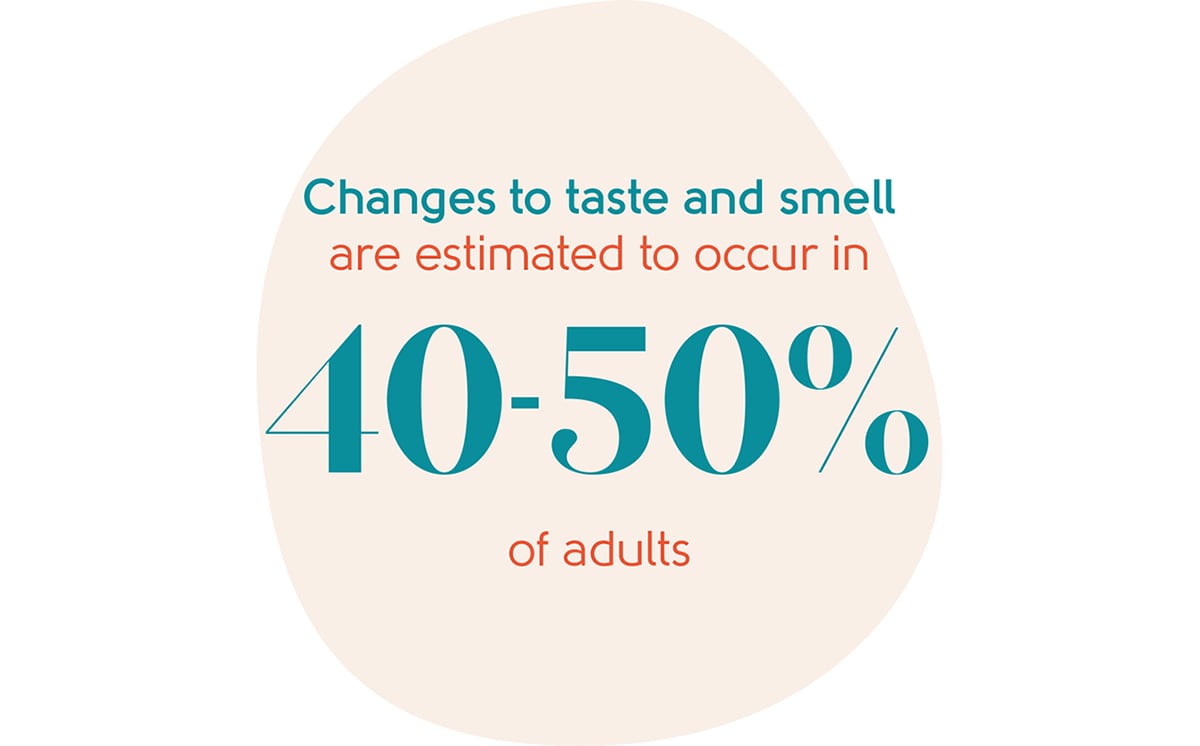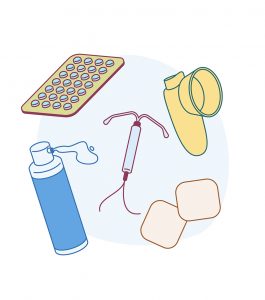Downloaded from www.mymenopausecentre.com
Direct URL: https://www.mymenopausecentre.com/symptoms/changes-to-taste-and-smell/
Menopause and changes to taste and smell
Taste and smell can change with the menopause. Falling oestrogen affects saliva, which can reduce or change our sensation of taste. Ageing can make these sensations less intense.
Explore

Book an appointment
The highly experienced doctors and nurses in our menopause clinic are here to help you. Appointments from £190.
Book An AppointmentIf you would like to learn more about the impact of your symptom(s) complete our free online menopause questionnaire here.
What are menopause-related changes to taste and smell?
Menopause affects many things in our body, and while lots of the symptoms are well known, others come as a surprise for some women. A change to taste or smell is one of the menopause symptoms that raises a few eyebrows.
What causes changes to taste and smell?
There’s a link between oestrogen and saliva, which means that for some women, falling oestrogen levels can result in a reduction in saliva flow from your salivary glands.
We all need saliva to break down food into individual chemicals. Taste buds detect those chemicals as different flavours. So if you have less saliva and dry mucous membranes, your taste sensation is reduced or changed.
If this happens to you, menopause isn’t necessarily the cause. Getting older can also affect your taste buds and sense of smell, making sensations less intense for both men and women. Taste buds don’t regenerate as quickly as they did before menopause, meaning there are fewer good ones left with which to taste.
How many women typically experience changes to taste and smell?
Changes in taste and smell are common in life. It’s likely that up to 1 in 4 people have a sense of smell dysfunction and up to 1 in 5 of us have a taste dysfunction. These symptoms are reported by some as being more common in the menopause, made worse by menopause-related dry mouth, but there is a lack of data showing how frequently.

Are changes to taste and smell linked to any particular stage of the menopause?
If the changes to taste and smell you are experiencing are related to decreasing oestrogen levels, they may happen at any stage of the menopause.
How can changes to taste and smell be treated?
There are a few good habits to get into to help with this symptom of the menopause:
Good dental hygiene
It’s essential to practice good dental hygiene and see your dentist regularly.
Drink plenty of fluids
Staying hydrated during the menopause transition can help lessen symptoms, so always having a water bottle to hand is a great idea.
Chewing gum
Chewing gum mimics eating and so can help release saliva into the mouth.
Artificial saliva pastilles and sprays
You can purchase these from your local pharmacy.
Avoid certain foods
Some foods can leave you feeling dehydrated and irritated, so it’s best to steer clear of them during the menopause transition. These include anything very hot, spicy, salty, or crunchy. Sugary and acidic foods increase the risk of tooth decay.
 Avoid alcohol and caffeine
Avoid alcohol and caffeine
Both of these can dry out and irritate your mouth. Try switching to herbal or decaffeinated tea and coffee for a while and see if it helps – it often does. Alcohol contains sugar and acid and increases your risk of tooth decay.
Stop smoking
As well as reducing changes to taste and smell, your overall health could improve. If you would like help to quit, the NHS is a great place to start.
Apply lip balm
Lip balm can help keep lips hydrated (a knock-on effect of dry mouth is dry lips), and stop them from cracking and becoming painful and sore.
Hormone Replacement Therapy (HRT)
More studies are needed to find out if HRT can help with changes to taste and smell. It’s worth bearing in mind that HRT can effectively treat other symptoms of the menopause transition. You can learn more about HRT here.
What next?
If you’re worried about changes to your taste and smell you should seek medical advice from your GP or dentist. To talk about your symptoms in the context of the menopause, book an appointment with our menopause clinic.
If you think you may be experiencing symptoms of the menopause transition, you can learn more with our symptom checker or by taking our Menopause Questionnaire.
You can also find more information about the menopause transition at the British Menopause Society and the National Institute for Health and Care Excellence.
Authored by:
Dr Clare Spencer
Registered menopause specialist, GP and co-founder; see Dr Clare in person at The Spire Hospital, Leeds or online
Last updated:
07/04/2021
Book an appointment
The highly experienced doctors and nurses in our menopause clinic are here to help you. Appointments from £190.
Book An AppointmentLearn more
Join the pause. community
We’ve created pause. as a space for women to come together and share stories about their menopause experience, ask questions, and to find support and inspiration. We'll also share the latest news and updates on the menopause from our experts.
Want to be the first to hear our latest news? Join our pause. community today.
Share your email to receive the latest news, updates and information on new products and treatments from My Menopause Centre and our pause. community. You can unsubscribe at any time.
We're committed to protecting and respecting your privacy - see our Privacy Policy and Terms and Conditions

Book a consultation
Whether you want to discuss your symptoms, create a treatment plan that's right for you, understand some test results or have a check-up, the highly experienced doctors and nurses in our menopause clinic are here to help you.
Book nowReferences
-
Source: Rawal S, Hoffman HJ, Bainbridge KE, et al. Prevalence and risk factors of self-reported smell and taste alterations: results from the 2011–2012 US National Health and Nutrition Examination Survey (NHANES). Chem Senses 2016;41:69–76.
Contact My Menopause Centre
- General enquiries: hello@mymenopausecentre.com
- Book appointments online: Log into your account and go to 'My appointments'
- Book appointments by phone: 0333 444 1067
- Website: https://www.mymenopausecentre.com


















